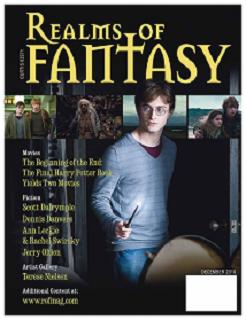 “Queen of the Kanguellas” by Scott Dalrymple
“Queen of the Kanguellas” by Scott Dalrymple
“The Banjo Singer” by Dennis Danvers
“Maiden, Mother, Crone” by Ann Leckie and Rachel Swirsky
“Tools of the Devil” by Jerry Oltion
Reviewed by Jo-Anne Odell
“Queen of the Kanguellas” by Scott Dalrymple is set in Portuguese West Africa, in 1899. As told through her diary, the protagonist sets out on a guilt-driven search for her missing father, with three native men as guides. While in Ovimbundu territory, she and her party are obliged to stay while a witch hunter, a Mavumbula, searches the tribe. When the Mavumbula denounces the chief, our heroine objects. She challenges the Mavumbula to a poison test, and wins.
The mystic and the natural become intertwined. Ilu, one of her guides, contracts malaria and departs. She reveals a past that includes the disease, the loss of someone close named Edward, whom she claims to have killed, and the effect on their family of her father going native and leaving them.
An attempt to free slaves goes awry. She’s captured, but freed by Ilu, who shows himself to her in visions. The Mavumbula also speaks in her dreams.
She finds her father, and the reason for her guilt is revealed.
I found the prose clear, but the story long and dull. Even in the action, its plodding tempo didn’t vary.
“The Banjo Singer” by Dennis Danvers tells the tale of Maria. Her father owns a store that sells musical instruments, but all Maria wants to do is sing. She gets her chance when her father pushes her to learn banjo with Garver Williams. She learns to play, but soon she’s singing, instead. When her father hears her on the radio, he forbids it. So Garver marries her. When he also tries to stop her, Maria’s supposedly-dead mother appears and tells her to move on. She leaves town with Jimmy, the engineer from the radio station, who gets her a new gig. And then she sings on a cruise ship, and so on, until her father catches up with her.
This story doesn’t work. Maria is a cardboard cutout, devoid of personality. We’re told she’s sent to learn banjo, she’s picked it up fast, and then, she’s marrying the teacher, who’s ‘always’ loved her. Is that ‘always,’ as in a couple of weeks? Not only that, she’s marrying a much older man, one she presumably barely knows, and she has no opinion. None. She’s a piece of fluff, blown about. Her father, as villain, appears more a hapless clown. Though there are several plot elements tossed in, they also fail to gel, and remain pointless.
In “Maiden, Mother, Crone” by Ann Leckie and Rachel Swirsky, Marjan flees her village and her dead husband’s family. Gravid, she fights a storm. She’s a Marked woman who fears, not only for her life, but for that of her babe. When her in-laws come after her, it’s not to hurt, but to help. As she delivers her daughter, she discovers the power within her, and the goodness within them. And she develops a plan.
This is a better story. It gets to the point and stays on track, keeping a fast pace.
“Tools of the Devil” by Jerry Oltion introduces Mary, who’s made a deal with Satan. She’s thought carefully and bargained well. Even better, she thinks she’s found a way to stop him from collecting. It all works out just as she expects, until the end. For a moment, it looks bad, but then her prospects change. They get even worse.
Its light-hearted treatment and flippant voice suit this original tale. In fact, they save it. The story is engaging only at the beginning, and again in the last few paragraphs. The middle is filler, a laundry list of events.
I understand this to be the last issue of Realms of Fantasy; I offer my condolences. Best wishes to all those who were associated with it in their new endeavors.